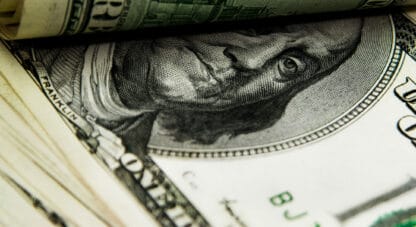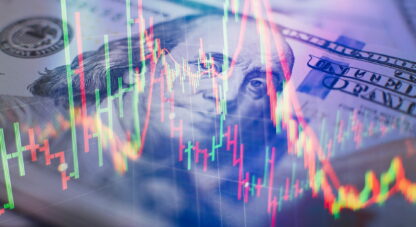Podcast: Play in new window
- Germany shocked by 37.2% producer price explosion
- John Taylor "We have inflation all over the place"
- Iran stockpiles 3800 kgs of enriched weapons grade uranium
China Gobbles Up 80 Tons Of Gold
August 23, 2022
"The discussion has been around these enduring issues of Chinese economic growth, Chinese economic numbers being the first point of pressure in the oil markets. And of course the oil markets and the energy markets are one of those things that are ratcheting up pressure within Europe. So the higher those prices have gone, the more desperate things have become, in Germany, in the Eurozone, and globally." - David McAlvany
Kevin: Welcome to the McAlvany Weekly Commentary. I’m Kevin Orrick, along with David McAlvany.
Well, what a difference a week makes, Dave. You’re situated in a place that you didn’t expect, but for the 35 years that I’ve worked with your family, I remember your dad over and over and over saying, “Live with it. You got to go with it. Life is a moving target.” I can’t tell you how many times I’ve heard life is a moving target. And actually that’s been very helpful.
David: That is one of those phrases I’ve heard and still hear countless times from my dad. Life is a moving target. And life definitely felt that way over the last week. The markets didn’t offer up anything extraordinary, at least in the US, but life did. And an email came from my dad last Tuesday, as I was finishing up preparation for the podcast. It was about my mom. It was a diagnosis of cancer. That was on Monday. Of course, they’re ahead, being in Asia, across the international dateline. Surgery was scheduled for Friday. One of the shortest pieces of writing I’ve ever received from my dad, and brevity for him is an indicator. And I could feel every word that was left unsaid, but certainly between the lines there was, life is a moving target.
Kevin: Dave, we realistically understand here as a family and as those who’ve worked with the family as long as I have and some of the other guys have, we realize that Molly really is the anchor, the backbone. Don was known for his newsletter. You had talked about short note from Don is almost impossible because his newsletter sometimes used to run 40 pages long, but your mom’s really the person who started, down in the basement, this company back in 1972. We all love her dearly, and we were very sober to hear the news, and immediately started praying for and would ask the listeners to pray for her. But you didn’t know last week at the time that we recorded the Commentary that you’d be in Malaysia today.
David: No, I didn’t really see that at the time. No, I didn’t have the imagination that I would be in Malaysia. I’m sitting in the shadow of the Petronas Towers in downtown Kuala Lumpur, and that’s today and for the next 10 days. Mom had a successful surgery on Friday, and is running around like nothing happened. So this afternoon we went for a walk after breakfast, and then seemed to linger over lunch till the afternoon was gone. The hours just slipped by as we sat and talked. So lots to talk about, always chipper, always positive, always curious, not a surprise that she’s planning the next family reunion and thinking about where nearly 40 of us can gather for meals and games and adventures and the creation of future memories.
Kevin: You wrote a book on legacy. And it’s mainly about your family. Hopefully all of our listeners have read the book or will have a chance to read it. But we do find that this is a person who knows what to trust and how to actually be a matriarch of a family.
David: Quality attributes that stand out. These are the things of which legacy is made because it’s what goes into the relationship. She’s indefatigable, she’s unrelenting. She’s determined, occasionally stubborn. There are a whole host of things that I see every day reflected in one of our kids mirroring their grandmother. And I tell them as much, but strengths come in many forms. We have both my parents who contribute to that. Muscular brawn, if you’re thinking about what strength looks like, frankly holds nothing to the ferocity of that woman’s single-minded steadiness. As I walk around Durango, our hometown, it’s not uncommon for me to run into someone who says, “You’re a McAlvany. Do you know Molly?” And it’s interesting because, as I travel around the world, I may hear the other side of that. “Are you Don’s son?” But in town, where for years she rubbed shoulders with everyone, everyone thought she was their best friend, and her impact not only in terms of that strength, but also tenderhearted compassion. For those of you who don’t know my parents, my dad is a force of nature. If a hurricane could express itself without the destruction, that might be him. There were times growing up when it felt like you had to lean against the wind just to stay standing. So it’s amazing to see them. It’s amazing to see how different two equally strong personalities coexist.
Kevin: And I think oftentimes they say often the strength of a man is the woman behind him. And that’s definitely the case with Molly and Don. Don can express himself like a hurricane because he knows that Molly’s there. Well, with you traveling, Dave, I think of some of the Commentaries that we’ve had in the past, where you are a long distance away, yet I feel like you’re right in the studio. Now I know you do a lot of reading when you’re flying. Andrew Smithers was a guest of ours on the Commentary. He’s written a number of books. You were going to take that book with you. I remember the podcast when you interviewed him. You were in Scotland and there was a harp behind us. And so people would say, well, so was there a harpist in the studio? It’s like, well, no, this is the miracle of technology. Dave’s sitting— Where were you, Dave, when you were interviewing Andrew Smithers?
David: Oh, it was Edinburgh Scotland. There was a course that was being put on, Edinburgh Business School. And our friend Russell Napier had brought together a number of very interesting contributors for this course on the history of financial markets. And so this time around, 30 plus hours of travel one way gave me the chance to start and finish Andrew Smithers’ new book, The Economics of the Stock Market. This style of this one is harder to read than his others, but I think the audience is more academic intentionally. He has a bone to pick with a particular school of thought, and so is trying to make some careful distinctions.
So two of my past commentary guests wrote endorsements for him, William White, the former economic advisor to the Bank of International Settlements, and Charles Goodhart from the LSC, London School of Economics, where he taught for years, but also former chief advisor to the Bank of England. Content’s been excellent. It’s been challenging. And I hope to explore some of those ideas next week before we speak to Mr. Smithers on the Commentary directly.
And so for those of you who haven’t read an earlier book of his, Valuing Wall Street, to me it is a cult classic. I might be the only one who thinks that, but it’s with ideas that I think every professional investor should be familiar with. Bottom line is, stock markets mean revert, and they go from undervalued to overvalued. And the movement either way is the key to improved returns over time, both reducing risk and also increasing returns in a period of buy low, sell high, or pick another similar notion.
But reflecting on the value of Robert Schiller’s work on the CAPE, an acronym for the cyclically adjusted price earnings ratio. And then he took that and refined it further to improve the metrics and math of this idea of mean reversion. He uses Tobin’s Q. Tobin was a Nobel prize winning economist, and the Q ratio, which is basically price relative to company assets, Smithers goes into the math and backs the statements with great data. It’s not too much to say that Andrew Smithers cracks the code on making money and not losing what you’ve made. So if you’re unfamiliar with his work, frankly, I would position what you have in the markets in cash until you know what the heck you’re doing. It’s too important to ignore. Valuing Wall Street is certainly a place to start with Smithers.
Kevin: Well, and oftentimes someone who understands how to value something, sort of like looking under the hood of a fine car, he knows how to value something. So oftentimes he will be out of the stock market. When it’s rising, he’ll be sitting in cash. And I think he’s been perfectly fine doing that over and over and over as he makes money and rarely loses.
David: Yeah. If you look at these longer stretches, 10 to 12 years of growth followed by 10 to 12 years of underperformance, there’s times that he’s just not participating. And in a few years— I call it a shoulder season where he just chooses not to be around. His latest book expands into a more theoretical discussion, critiquing neoclassical economics. And he basically says it’s left financial markets and leverage out of the modeling used to explore economic behavior. It is a harder read by far, but we’ll get to it next week, perhaps, and look at it in a little bit more detail. So needless to say, jet lag is my friend and companion, and I’m finding myself tossing and turning on the pillows with economic arguments running through my brain, and at times being overwhelmed by a harp playing in the background. So, yeah.
Kevin: Brings back memories, yeah.
David: Exactly. So go to the archives, one of my last conversations with Andrew. You’re right. I think it was The Balmoral Hotel in downtown Edinburgh. In the tea room beneath us was the harpist playing away, in what makes this truly a bizarre podcast.
Kevin: You were talking about two people who had endorsed the book that were both Commentary guests in the past, William White and Charles Goodhart. Dave, which of the two was the one that talked about how the model actually changes what’s being measured? I thought that was fascinating. It was one of those two.
David: Yeah, Goodhart’s Law is, when the measure becomes a target, it ceases to be a good measure. And so there is a change, there’s a transformation, and data becomes less important as it’s essentially undone by the observation. I think physicists have come to a similar conclusion that things change when observed.
It’s interesting to see what the world of medicine looks like. We’re here and considering the path that my mom’s going down, and its fascinating to reflect on what that world of medicine looks like when not corrupted by insurance company interests.
And so I’m at lunch with my parents, and it reminded me, and we discussed, how far science has been subsidized and co-opted by property and casualty insurers. They tell you what to fight, where the fire science curriculums teach how to save, what to save, with a very definite cost/benefit analysis aligning with the insurance company’s risks and liabilities.
And modern medicine, too, is more and more co-opted in a similar way by pharmaceutical companies, and of course insurers, who organize modern medicine and fund research in a way that complements their revenues and promotes their product offering.
Of course, Big Pharma’s reach is global, but the insurance company rot is not. And so this week, engaging with qualified doctors here in Malaysia, you find a very different cost structure in the absence of insurance companies. And this is one of those places where there’s been medical tourism, if you will. It also happens to be just a few hours flight from where my parents live in the Philippines. So, for them, getting to Singapore, getting to Kuala Lumpur, are two amazing options. And in the absence of insurance companies, again, things just look very differently. This is not compelling, but it’s a curious anecdote.
Kevin: So for any kid who wonders if math actually matters, the insurance companies figured out the math and it’s transferred to everything else. Look at how much better the insurance companies have done than even the S&P 500.
David: Well, that’s right. And maybe this is just an anecdote, but since the signing of the Affordable Care Act, again a little bit like the Inflation Reduction Act. Be careful of the actual meaning and perhaps the implications of these things, but the “Affordable Care Act”— Amazingly, health insurance companies have appreciated five to six times more than the S&P 500 in that timeframe. Big surprise, I’m sure, for you.
But you might be wondering why I’m in Kuala Lumpur. As I mentioned earlier, this is one of the great places in Asia for medical care, and living in the Philippines, medical care in that country is 50 years behind the curve. But just a few hours flight away is either Singapore or Kuala Lumpur and that’s not the case. So for my parents, life is a moving target. And this week for me, life is a moving target, and I’m grateful that they have resources at their disposal to respond to the shifts of unexpected circumstances, which is important.
Kevin: Well, and unexpected circumstances reminds me of the words unintended consequences, moving to the markets. There are so many factors that can affect oil, let’s say, which has seen some downward pressure here recently. But give us an idea of what’s going on in that sector, Dave, because we’ve got the Iranian thing going on. You’ve got the Chinese economy. You’ve got the Jackson Hole meeting coming up this Friday. The unintended consequences show up. You’re changing the model again—or the model is changing what’s being measured.
David: Yeah, it’s an important movement. We’ve got strengthening of the crude market this week, but a major move lower in previous weeks. And the discussion has been around these enduring issues of Chinese economic growth, Chinese economic numbers being the first point of pressure in the oil markets. And of course the oil markets and the energy markets are one of those things that are ratcheting up pressure within Europe. So the higher those prices have gone, the more desperate things have become, in Germany, in the Eurozone, and globally. But then the second factor is the notion that a deal with Iran would get pushed through, and a response letter that went to the EU last week, and so very positive dialogue about another million barrels of oil coming to market from Iran. But I doubt number two is really going to be an issue, for some clear reasons.
Kevin: Well, yeah, one of the pressures is if we were to strike a deal again with Iran, their uranium issue is the real issue, isn’t it?
David: Oh yeah. Last week I met a family from Israel. It was on date night, and it was actually the same day I found out about my mom. But we were out at our favorite Italian restaurant, and this family from Israel, their son’s name was Yuval, and it was like a file folder had been accessed in my mind. My memory is refreshed. The only other Yuval I know is a gentleman who lives in Israel. So there on date night, it reminded me of a breakfast I had with him. Maybe it was 2009, and this is in Jerusalem. He was a philosophy professor that had just recently become the finance minister. His name is Yuval Steinitz. He’s held a half a dozen other post in Israel since then. And by 2014, he was Israel’s minister of intelligence. And I remember an article he wrote in the New York Times at that time, 2014, just before the 2015 Obama deal with Iran. And it was a very clear criticism of the deal with Iran in advance of that deal being finalized. He was concerned about the direction of uranium enrichment, and not impressed by Rouhani’s quiet demeanor, the issues of substance beating out the improvement in political tone. No, he wasn’t dealing with Ahmadinejad, but still Rouhani was moving the ball pretty aggressively on both purity and quantities of uranium.
Kevin: So is it ignorant to believe that we can believe what the Iranians say about uranium?
David: Yeah. It’s just a question of relying on a “partner” to do what they say they’re going to do. And so there’s a tremendous amount of trust there. I think that may be trust that’s misplaced. Since then, according to New York Times, this is August 16th of this year, Iran has blown past the purity limits of the 2015 deal and the quantity limits of uranium as well. So there was a prescription for 300 kilograms and a purity level of 3.6%, I think my memory serves correctly, and they’re at 3,800 kilograms. Purity levels are now at 60 versus 3.6%. 60% is not required for energy production, but is the level that you would expect for weapons grade. So again, returning to oil price volatility, if price weakness is predicated on Iran oil supplies coming to market, that extra million barrels a day, following a refreshed nuclear deal, I think those traders are going to be disappointed.
Kevin: Well, you’ve mentioned other factors also pressuring oil to the downside, China. Give us an idea of what’s coming out of China and what we can expect.
David: Well, the reality is supplies have been relatively tight. So it’s the anticipation of demand destruction that’s really on people’s mind. And China may be a better actual cause of pressure on the oil market, essentially selling the rumor of demand destruction. But in my opinion, you’ll see a targeted preemptive strike on Iran from Israel before you have a new deal on that front. So Iran has too much fissile material to be allowed to come back into the sanction-free world and maintain their nuclear program. So again, any pressuring of oil prices lower, you might find in the talk of that and the talk of move with Iran and a new treaty.
You might hear all that for political reasons as the election looms just a month or so out here in the United States, anything to talk down the price. But I think if that actually occurred, it’d be suicidal in the end. Such a move would refashion the 2007 North Korea agreement, which ultimately left the Korean program intact, allowed them to produce nuclear weapons thereafter, and it showed a bit of naivety on our part, hoping for transparency, relying on North Korean honesty, and expecting continued accountability.
Can we make those same moves with Iran? I think it was foolish in the case of North Korea, and might be foolish expecting the same from Iran. Sort of foolish in 2015, certainly equally foolish now. So European and American politicians might trade the next election for global stability, but Israel will not, thank God. I don’t know what you all’s thoughts are at present, but I appreciated, going back to that 2009 breakfast, I appreciated the state of Israel’s embrace of a philosopher as a reasonable choice for finance minister.
Kevin: Was it that same trip, Dave, when you went back to Israel that you ate dinner with Yehuda Avner, who was so close to Menachem Begin?
David: Well, yeah, in fact it wasn’t just Begin, but he had been an advisor to five different prime ministers, and yeah, that’s a conversation from our archives on the podcast that would be worth going back to. Avner was a very religious man, and considered to be less political, I guess you could say, with party allegiances that might have taken him out of the running as an advisor to the prime minister. But nevertheless, a major contribution as a wise sage throughout most of Israel state history.
Kevin: Yeah. We’re talking about China also, and looking forward, they’re thinking that the growth is going to shrink, but actually there has been an awful lot of gold buying recently at these lower prices from China directly.
David: Well, that’s right. And I’m reminded of my dad, of course, sitting here with him in the last few hours, but we talked about the gold price and it being lower and he sort of grinned with this schoolboy grin and just says, “I love buying gold a little cheaper.” And it’s funny because the Chinese, it’s one characteristic he shares in common with them. He doesn’t like to overpay for gold, and the cheaper it gets, the more enthusiastic he becomes. So here we have Goldman Sachs lowering growth projections for China to 3% from 3.3, and Nomura Securities to 2.8%. This is GDP growth for the year down from 3.3%. The original target of course set at the beginning of the year by the Chinese government was over 5—5½%.
So we’re at a very interesting juncture when it comes to added pressures. We could very well see actual pressures in the oil markets. And again, I think it so far has been in anticipation of demand destruction. But keep in mind that if Chinese economic growth continues to shrink or even go negative, there’s likely to be massive fiscal stimulus and stimulus from the People’s Bank of China at a scale that is RMB negative and US dollar positive. And so enter into that thinking this recent announcement of Chinese gold imports up considerably last month, and this is reported by Bloomberg here recently, China shipped in from Switzerland more than 80 tons. That’s in the month of July. That’s double the previous month and eight times more than in May.
So again, if you were looking at the dollar being in this streak higher and gold going lower, there are some people of the opinion that, wow, you should abandon the gold trade, but again, we’re on the cusp of RMB devaluation. We’ve got the euro being sold off at the same time. You’ve got the yen moving to and hanging out at all time lows. And it’s not a surprise. It’s not a surprise to see dollar strength in the context of those other currencies being incredibly weak.
And I think we’re dealing with the knee-jerk response in the gold market of lower prices because of higher dollar. Am I concerned about gold going lower? No, no. Gold was down 3% last week. Silver dropped closer to eight, truly a more volatile asset, both on the upside and the downside. And I think some traders are missing the bigger picture. The dollar is not strong, not on its own merits. It happens to be, merely on a relative basis.
So Doug Nolan pointed out over the weekend, there’s growing stress in the emerging markets. There is growing stress at the European periphery. And both last week and this week there’s been a return to hedging. Credit default swap prices have moved up considerably in the last three to five days. And I think this is worth keeping in mind, actually a huge amount of destabilization within the financial markets, and gold is reflecting dollar strength. It will be returned to shortly.
Kevin: Yeah, it’s amazing. We’ve talked over the last couple of weeks how we can see things just from an American point of view, a US dollar point of view. But relative to these other falling currencies, the dollar’s strong relative to those currencies. Relative to other currencies, gold is actually going up very nicely.
David: Yeah, and again, if you’re looking at emerging market weakness, European peripheral debt strength, increase in the price to ensure against default within the global fixed income markets. In that environment, the dollar wins as others are losing, but that’s not the story of a winner. It’s just the story of a better-looking loser. And so for the time being we see pressure in the gold markets, a retest of 1675 in the gold markets likely in my mind, and at the current levels, just above the 1675, of course silver under 20, I think you’re looking at a value play. Whether your timeframe is here to the end of the year, or if you’re looking into a number of years ahead, I think you’re looking at a tremendous opportunity to add to ounces.
Kevin: Every year at this time, those who feed the Leviathan, the central bankers, all meet at Jackson Hole. And I don’t mean that to be mean, but everyone watches Jackson Hole. We’ve had a number of guests who were advisors or people who were key players at the Jackson Hole meeting. That’s coming up this week. Do you think that a lot of people are watching to see if Powell is going to pivot or if he’s going to get bold?
David: Yeah, of course this week is very significant because financial players from around the world are looking for clues as to the future direction of policy. And the markets are betting that the Fed will not significantly raise interest rates, that perhaps we get to 3½, 3.75 by the end of the year. And then in fact, as we get into 2023, lower those rates in then not-too-distant future.
But I was interested, Henry Kaufman wrote about this last year, telling the story of going from being the Wall Street famous bear, I think they called him Dr. Doom, to being very bullish. Today he’s a retired Wall Street veteran. At that time, he was the Salomon Brothers legend and was moving markets. Henry Kaufman, who 40 years ago called one of the great market turns converting from extreme bear to bull in 1982, he said this just in the last week, he’s in his nineties now, says the Fed is not combating inflation with any resolve.
His quote is, “I’m still waiting. I’m still waiting for him,” which he meant by that, Jay Powell, “to act boldly. Boldly means he has to shock the market. If you want to change someone’s view, if you want to change someone’s action, you can’t slap them on the hand. You have to hit them in the face.”
Well, we’ll see if Jerome Powell takes the Jackson Hole meeting as the opportunity to punch Mr. Market in the face. I’m betting against that. Raising rates at this point impacts corporate leverage significantly. It impacts households. It impacts government borrowing costs. And of course, in an over-leveraged universe, it’s just too consequential to do very much of that.
Kevin: Dave, I love the fact that you’ve picked so many interesting guests that continue to show up because John Taylor would say interest rates are going to have to exceed inflation at a certain level. And we’re a long ways away from that right now.
David: Yeah. Where they should go, where interest rates should go, or in fact need to go, and where they can go or will be allowed to go, are two very different stories, aren’t they, Kevin? Because on the one hand, you’ve got the Taylor rule, which implies that borrowing rates should be above the inflation rate. And that just can’t happen in this environment. Be catastrophic to the financial market. So looking at the third unofficial mandate of market stability, the Fed is loath to do that.
I’m sitting here in Asia, watching the Bloomberg interview with John Taylor from Stanford, and he’s saying we have inflation all over the place right now. Jackson Hole is the main event this week. And I wonder how the Fed will approach this. It’s almost like the old Gordian knot, very, very difficult to untie. Not easy. And as we look at next week, we’ll explore in Smithers’ book leverage and the financial market dynamics, which are now very much a part of the picture for the Fed. It has to be. These are factors that maybe have been ignored in the past, and certainly are not a part of the academic conversation, that neoclassical model, but have to be thought of and reflected on.
Previously, of course, financial market dynamics and leverage were neglected by economists. And that’s what policymakers are dealing with. It’s a complicating factor. There are implications. The stakes are incredibly high, based on what is said and the actions and the policy preferences that are expressed here at Jackson Hole. So the markets are watching that soiree for real direction.
Kevin: Dave, I was talking to Morgan this morning. He’s our market strategist here, one of them, and he got up and talked about the high, high rates of inflation in Germany. And I just went back to his office and I related a story that I had heard back in the 1990s. Of course, Germany has been through so many painful years between wars and inflations, that it’s deep, deep at the core—the fear and the concern for inflation. And I shared a story about a man that— he did some money management for us— very, very experienced— from Germany. Klaus Bucher was his name, and I remember him meeting with me in New York.
We were there in New York in the ’90s, and he says, “Kevin, I want to tell you a story about inflation.” He said, “Our family, before the ’20s, had paid off their house, and we went through the hyperinflation. We had to go back and borrow and remortgage our house, and by the time World War II finished, we had paid that house off. And then we had to do it again because of the inflation.” In fact, they survived two years just by having vodka in a cellar, because that’s what they had to trade. They had the hyperinflation. And when I was there in the 1990s, he told me, he says, “Just recently, my family has finally paid off their house for a third time. The fear and the concern for inflation goes all the way to the core of a German.” And now look at the German producer price index numbers that are coming out. It’s unbelievable.
David: Yeah. The markets were definitely surprised by that German PPI. This is the wholesale price index, as opposed to the consumer price index. In Germany, exceptionally disturbing, with a 5.3% monthly gain in July.
Kevin: Monthly, monthly. Wow.
David: So the year-on-year change of 37.2%—and that’s on the continent. In the UK last week, there was an equally disturbing 10.2% inflation number—which, those two things combined, it’s probably not a surprise. I mentioned that there wasn’t a lot going on in the US markets here in recent days, in the last week in particular, but in the European bond market, oh my word. To see rates across the board of the indicators that we refer to in our asset management group every Monday and Wednesday as we gather, there was peace and calm in certain segments of the indicator spreadsheet. And oh my word, this was an area that was going nuts. The European bond market in disarray. And that action continues into this week. So John Taylor said earlier today on Bloomberg, we have inflation all over the place right now. And that certainly is a reflection that applies if it’s US-centric. But the reality of high inflation is universal, even if it’s not uniform from country to country.
Kevin: Well, if you look at that astounding 37.2% increase on German producer price index, those producers are having to pay for energy, and that energy, a lot of it’s coming from Russia. That seems to be affecting what they’re paying to manufacture what ultimately turns into consumer price, right?
David: Well, yeah, as they got out of the plane, I decided to bring Smithers’ book, because I’d like to have a conversation with him about it and I think it’s important. When he speaks, I listen. And not that I agree with everything that he says, but I’ve learned a tremendous amount from him, and continue to.
But I also brought two other books, Shifting Involvements, which is an Albert Hirschman classic, probably less known than his book Exit, Voice, and Loyalty. But Shifting Involvements is also one of the things that’s on my mind, dealing with how individuals engage in the public square and how they retreat into private interests.
The third book is Financial Statecraft. Benn Steil has been on the program once, not relating to that particular book. We talked about Bretton Woods and the influence of Harry Dexter White in the creation of the Bretton Woods system. But Financial Statecraft is a fascinating look.
Again, one is I had some time to read, 30-plus hours gives me that time to read, to look at the role of currencies, the role of devaluation, and how some of these things actually tie in as Benn Steil argues, to statecraft. Many of these decisions are deliberate. You have to keep in mind that perhaps there is a needle being moved that has nothing to do with economic growth, and far more to do with global control. And so banks and bombs, currencies and crises, the security dimensions of a currency crisis. There’s some insights, I think, that need to be borne in mind as we’re talking about devaluations and economic pressures. Some things are out of policymakers’ control, and some things are very much in their control.
The big surprise in Germany, going back to your question, Kevin, is the industrial miracle of the last 20 years and the great progress that has been made, predicated, unfortunately, today on cheap Russian oil. So energy prices, particularly on the continent, and of course in Germany in particular, that’s been an external pressure point. Limited supplies of Russian gas are a big deal today, and are likely to be an even bigger deal as we come into the winter months. God forbid, a cold winter in Germany, that would bring them to the brink, I think. Which again, we’re talking about basically the destabilization factor for industrial Germany. Bloomberg reported that two years ago, German companies were paying 40 euros per megawatt hour. That number increased to over 250 the beginning of this year, and that through the beginning of the summer, actually, and now the year ahead, electricity rates sit at 570 euros per megawatt hour, up from 40 euros just two years ago. So this will either force industrial production in Germany to other geographies, or it’ll be the central driver crashing German economic growth. And of course, European economic growth as well as German. This is key. Germany has been the engine of growth for all of Europe for a long, long time.
Kevin: So you talk about an engine of growth, but one of the methods, if you were turning the dials, one of the methods of getting control of inflation, these rising prices, is actually having a recession. Looking at things going forward, could we have a recession that would slow this thing down?
David: Yeah, and some have suggested that might even be desirable. We’re creating a soft landing and helping a recession along coal’s demand, and maybe even moves us away from fossil fuels further. I think that’s a complicated topic and not one I really have strong opinion on. But energy costs, look, they’re considerably less in the US. That gives us a relative advantage. We’ve got natural gas supplies, and prices which are a fraction of what they’re paying in Asia and in Europe, and our exports, by the way, of fuel, are really at the red line. We’re looking at millions and millions of barrels of oil we’re exporting on a weekly basis. And I’m glad we have it. I wonder if maybe we held onto a little bit more of it, if it wouldn’t further the US concerns, but we have it, so we’re exporting.
Kevin: Did you see that study talking about recession by Stifel Nicolaus? 97% of the executives said that we are headed to a recession or that we are already in one.
David: Yeah. The two studies that we’re standing out to me in the last couple of days, PricewaterhouseCoopers polled 700 US executives, which is a pretty decent number. And that came from a variety of industries. And in the month of July, half of them said they’re preparing to reduce headcount or implement hiring freezes. And I thought that was really curious. Again, looking at the record job openings, looking at the JOLTS numbers, and in what has appeared to be an endless appetite for new hires, now you’ve got 700 executives saying we’re not pursuing larger pay packages. We’re cutting out some of those things. It sounds like they’re essentially battening down the hatches. And then you mentioned Stifel Nicolaus. Again, 97% of executives anticipating recession or headed towards one, with inflation and tight labor being the two primary threats. Is it possible that we’re on the cusp of seeing a reduction in pressure in the labor markets? And that to me has been one of the keys in terms of the longer-term inflationary trend. So we have to see how this unfolds, and obviously we still have a tightness in the labor markets, but executives are wanting to be ahead of the curve. And so reduction in headcount could be interesting as we come into October and the fourth quarter.
Kevin: Just Saturday, I asked my wife, I said, “Hey, I’ve got to run into Home Depot. You want me to bring you a Macho’s Restaurant breakfast burrito?” You know the restaurant I’m talking about. Stopped over south side of town, got a couple of great breakfast burritos, brought them home Saturday. I went over there this morning, Dave, there’s a sign on the door. And it says due to not being able to hire enough labor, we are shutting Macho’s down. So I didn’t get my Macho’s burrito today. I got something else, but you know, you think about it, and how long has the government been paying people not to work? It’s the strangest thing ever, where we’re moving into a recession. It’s almost impossible for some of these people, whether they’re painting a house or whether they’re running a restaurant, to be able to hire the people to run the business.
David: Yeah, I sometimes can’t help myself in terms of conversations. I like to talk, and I like to ask questions, and I was fortunate enough to sit next to a sales rep for one of the largest protein providers in the world. We’re talking about over a billion pounds of red meat a year, a billion with a B. A significant increase in wages, allowances for sick time and vacation pay, these issues had never been prioritized prior to COVID, or at least prioritized to this degree. And that company is gradually bringing back the workforce.
But that was one of the observations, is that it’s been difficult to find workers and we can’t run shifts. And so there’s an additional tightness in supply for beef and other proteins as a result of not being able to run full shifts. And GOP rep Jim Jordan was tweeting earlier this week when the government pays people not to work, it’s hard to find workers. Well, that’s right, but I don’t think that reality will last. It just has to do with how much more corporations are willing to pay. How much more flexibility are they willing to bring into a compensation package, again in terms of paid sick time, vacation time, and things like that. Because a part of the lack of productivity, if you will, has to do with corporations not being able to work full out. I’m surprised to hear Macho’s is closing. I would think that they would try to modify and maybe work a day less or not be open on Saturdays. So it’s a real thing to not have access to qualified employees.
Kevin: Yeah. You were talking about modifying. I think he had already tried to modify. The last few times that I saw him, it was just the owner pretty much doing everything. But people do change their habits. Like you said, COVID. Did you say something about COVID where people preferred red meat and now they’re moving to other meats?
David: It makes me reflect, Kevin. I’m grateful to be surrounded by an amazing team. And I’m glad that this is not a Macho world where I’m trying to do everything myself, at least making burritos. But I can be on the other side of the world, and our teams continue to function in a very healthy fashion.
But this issue of substitution, I asked this gal, are consumers changing their behavior? Are they moving from red meat to something else? And she said, “No, not yet. What we’re seeing is they’re moving from quality cuts to ground beef.” And again, the consumer’s penchant for substituting was kind of an interesting commentary. And she described the demand for steaks and premium cuts, which was sort of off the charts during the context of COVID. Households were not eating out, and so they wanted something to maintain normalcy. As this person described to me, it was almost like eating well was a coping mechanism in COVID. Grill a little bit more, and it’s a nicer cut, but you don’t have the same budget spend on eating out.
And currently your choice cuts are dropping dramatically in the US, favoring ground beef. And one of the observations was that those prices, as a result, are going to have to go up—that is, on the choice cuts—because they’re opting to not have as much in the herd that would fit the high quality beef standards.
So particularly in Asia, there is substitution, and it takes on an interesting dynamic. The demand for chicken as a substitute for beef is in fashion. She shared this fascinating anecdote from Japan, which was that the Japanese simply do not like inflation. And I thought it was funny. Because I don’t know who likes inflation. The Germans certainly don’t. I don’t. But the Japanese, she said, they don’t like inflation, and they’re very resistant to increased prices. So one of the cheapest meals in Japan is a beef entree, because the prices have not changed in several years. And a beef entree at a restaurant will have seen no increase in price because there’s this hesitancy to do so for social reasons. Rather than lose sales margins and sell a steak at a loss, the restaurant industry will simply deemphasize their beef offerings and promote chicken or pork instead. So they offer it. It happens to be very inexpensive, but it’s a low light on the menu.
And so here I am, of course, with a significant layover at the Narita Airport, and I’m in search of the cheaper beef. If you remember “The Father of the Bride,” one of the classic quotes from the movie, the father of the bride, is, “No, Franc, I want the chipper chicken.
Kevin: Martin Short and Steve Martin. Yeah.
David: Yep. I was looking for the chipper beef at Narita.
Kevin: Okay. Well you’re in Kuala Lumpur, Dave. I’m not sure what exactly you’re going to be trying to get cheaper, but I sure hope you enjoy your time with your parents. I understand it’s stressful with your mom’s condition, but I also know just the quality time that you guys spend together when you are together, it’s something that a lot of people really resonate with.
David: I’ll say this, yes, life is a moving target. And we have to adapt to circumstances that we wouldn’t necessarily have invited. But my mom in particular is incredibly flexible, and expresses resiliency in a unique way. I’ve seen her through the years as we’ve had ups and downs in our business, as we’ve had ups and downs in our family life—some of which I’ve created—she gets better under pressure. And I think she’s unique not only as a woman, but as a human being. So oftentimes men, women—it frankly doesn’t matter—when the pressure increases, things seem to fall to pieces. And that’s just not the case for what we dubbed the unsinkable Molly Brown. She is incredibly, and I was describing her as perhaps fierce, and I maybe I gave her a picture of a tiger. She was a gal from LSU, and so in that sense maybe she is, but— How do I say it? I think if life is a moving target, we have to be aware of what we need to bring to the equation. And this concept of resiliency and strength, whether it is the financial markets or health circumstances, outcomes—so many of them—are undetermined by us and our inputs, and we’re just left to respond.
Kevin: She’s a realist. She lives by faith. So does your dad, so does your family, but they also accept, speaking of realism, they accept that life is a moving target.
David: So it’s how we respond to life, not necessarily getting everything that we want, that I think is the most important. Life is a moving target. We just have to roll with it.
Kevin: You’ve been listening to the McAlvany Weekly Commentary. I’m Kevin Orrick, along with David McAlvany. You can find us at mcalvany.com, M-C-A-L-V-A-N-Y dot com. And you can call us at (800) 525-9556.
This has been the McAlvany weekly commentary. The views expressed should not be considered to be a solicitation or a recommendation for your investment portfolio. You should consult a professional financial advisor to assess your suitability for risk and investment. Join us again next week for a new edition of the McAlvany Weekly Commentary.
















